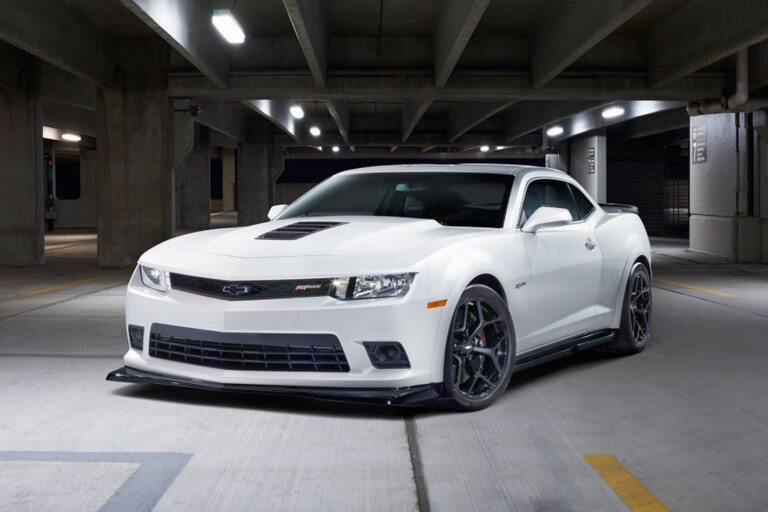
Former Holden chief talks down Aussie-developed Camaro
MARK Reuss, the head of GM’s North American division and a former overlord of the car maker’s Australian subsidiary Holden, has talked down the Australian designed and developed Camaro muscle car.
“The first-gen Camaro was a bit of a tortured birth because the architecture was something that was sort of loosely based on [the Holden-developed] Zeta at the time, but then brought into the United States, and we made a Camaro out of it – off of a concept car that wasn't completely architected yet,” he told Motor Trend magazine in an interview published online this week.
The fifth-generation Camaro, which shares the same underpinnings as the current Holden Commodore large rear-wheel-drive passenger car (sold in the US as the Chevrolet SS) and ute range, was launched in the US in 2010, shortly after Reuss’s departure from Australia to head up his home market’s operations.
The next-generation Camaro due in 2016, he tells Motor Trend, will be built off “a very mature and exclusive architecture” that will make it much lighter, more dynamic and cheaper.
Ford’s Mustang recalled to fix four-pot burnouts
STICKING with American iron, Ford has had to pull the recently launched sixth-generation Mustang back into service centres after four-cylinder versions were found to be at risk of a supercar trait – unexpectedly bursting into flames.
According to the car-maker, a pressure sensor on the turbo 2.3-litre four-pot’s fuel line – it will sell here next year alongside a 5.0-litre V8-engined version – can spring a leak and, if it meets an ignition source, catch fire.
Changes to the V8 Supercars format due in 2017 will allow a turbocharged ’Stang to scrap with the V8s, although, as we found out earlier in the week, if anyone wants to contest the championship it will be without Ford’s factory backing.
Saab in talks with mystery Asian investors
IN A week that Dutch supercar maker Spyker announced it was flirting with bankruptcy, car-making’s Lazarus with a triple bypass – Saab – has revealed it is in talks with a pair of unnamed Asian investors about kick-starting the brand once again.
One of the companies it is trying to woo is believed to be Indian-based industrial giant Mahindra & Mahindra.
Wheels spoke with the company’s chairman, Anand Mahindra, while he was on a flying visit to Australia last week and received a straight bat in response to several tempting line-and-length lollies asking whether it was actively in talks with anyone regarding a potential takeover, and whether there was any cast-off technology globally that it had its eye on.
Mahindra already has another car-making phoenix under its wing, having bought struggling Korean brand SsangYong in 2011; its SUV and trade ute range is ripe for development as part of the Indian car and tractor maker’s core business.
Small cars struggle for top crash rating
SMALL cars struggled a bit in the latest round of EuroNCAP tests that assess how vehicles will perform in a crash.
The Mini Cooper, the next-generation Benz-owned Smart ForTwo and the Renault-shared Smart ForFour – the latter currently under consideration for Australia – scored only four out of a possible five stars for crashworthiness.
The snub-nosed Smart ForTwo was marked down for poor pedestrian protection and scarcity of driver safety aids, while the ForFour and Cooper were mainly hurt by their lack of electronic driver aids.
A big bunch of SUVs sailed through with the top five-star rating, though, including the Porsche Macan, upcoming Land Rover Discovery Sport (which includes a pedestrian-protecting airbag as standard), Subaru Outback, Lexus’s new NX soft-roader, and the new Kia Sorento due on sale here next year.
France to phase out diesel cars
DIESEL’S biggest drawback – its more toxic emissions compared with other conventional fuels – will be its undoing in France, where vehicles running on the fuel face the guillotine.
Labelling its roll-out as a “mistake”, the French government has flagged it plans to make life difficult for diesel car owners – about 80 per cent of the nation’s fleet – with higher taxes and travel restrictions, such as banning them from inner-city streets, from as early as next year.
Drivers willing to trade in their dirty diesel on an electric car should expect a $14,000 kickback from the government, though.
The push to get more drivers into EVs does have a sting in the tail, though; about 40 percent of France’s electricity comes from nuclear reactors that, as we’ve seen a number of times already, could prove even more of a long-term worry than diesel emissions.
Meanwhile, diesel passenger vehicles are falling out of favour with Australian buyers.

COMMENTS